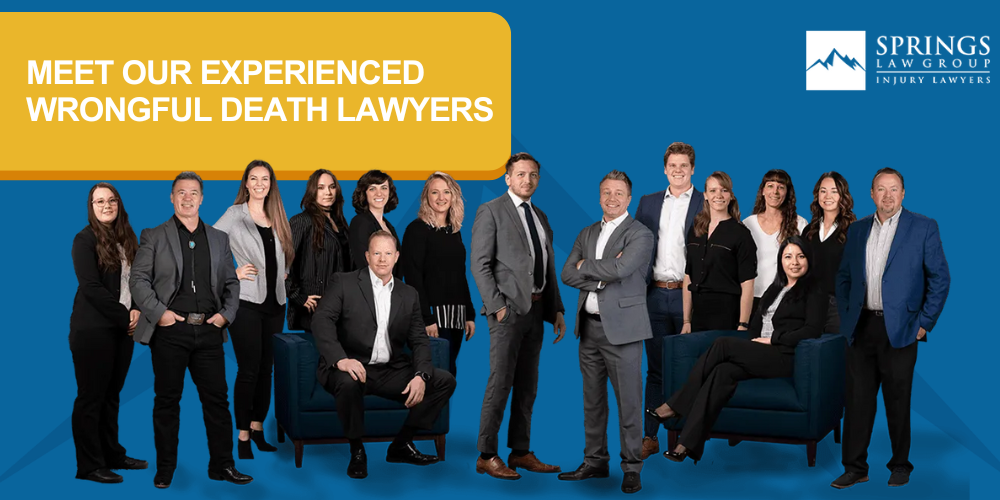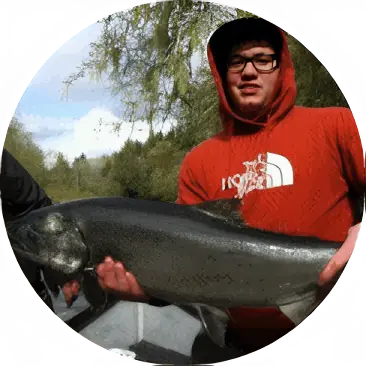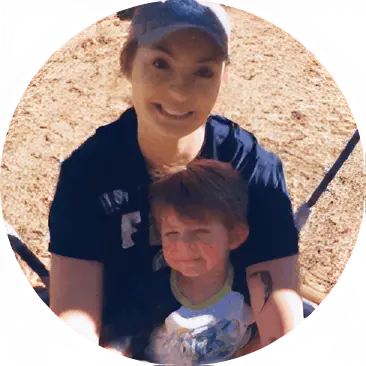
Member of the Colorado Bar Association since 2014. Attorney, Christopher M. Nicolaysen focuses primarily on helping those injured in Colorado car accidents, other auto accidents, and Colorado personal injury incidents.
This article has been written and reviewed for legal accuracy and clarity by the team of writers and attorneys at Springs Law Group and is as accurate as possible. This content should not be taken as legal advice from an attorney. If you would like to learn more about our owner and experienced Colorado personal injury lawyer, Christopher Nicolaysen, you can do so here.
Springs Law Group does everything possible to make sure the information in this article is up to date and accurate. If you need specific legal advice about your case, contact us. This article should not be taken as advice from an attorney.
The Colorado wrongful death statute outlines the legal rights of surviving family members to seek compensation when a loved one dies due to another party’s negligence or misconduct.
This law defines who can file a claim, what damages may be recovered, and the time limits for bringing legal action.
Understanding how the statute works is essential for families considering a wrongful death lawsuit in Colorado.

Losing a loved one is always devastating, but when their death was caused by someone else’s negligence or wrongful act, the pain can feel even more overwhelming.
A Colorado wrongful death lawsuit allows surviving family members to seek justice and compensation when a person dies due to incidents like a car accident, medical malpractice, or other preventable tragedies.
Under Colorado law, a wrongful death action is a legal pathway to hold the responsible party accountable.
These claims are not just about money.
They’re about honoring your loved one’s life and protecting your family’s future.
While no amount of compensation can undo the loss, a Colorado wrongful death claim can help cover financial burdens and provide a sense of closure.
Pursuing a wrongful death suit can be emotionally difficult, especially when the loss was extremely painful or unexpected.
An experienced Colorado wrongful death lawyer from Springs Law Group can guide you through this difficult time with compassion and clarity.
This page explains who can file, what damages are available, and how the legal process works.
If you’re considering legal action after a wrongful death, understanding your rights under Colorado law is an important first step.
Contact Springs Law Group today for a free consultation with a Colorado wrongful death lawyer.
You can also use the chat feature on this page to find out if you qualify for a wrongful death claim instantly.
The Colorado Wrongful Death Act (C.R.S. §§ 13‑21‑201 to 13‑21‑202) provides a legal remedy for families grieving the loved one’s death caused by someone else’s negligence, wrongful act, or felonious killing.
This law allows surviving family members to pursue legal action in civil court for wrongful death damages including funeral and burial expenses, medical bills incurred before death, and the decedent’s lost income and services to the family.
Because the claim is one collective “exclusive interest” action, compensation is shared among eligible survivors rather than each filing individually.
The Act is split into two complementary legal actions: the wrongful death action (on behalf of the survivors) and the survival action (on behalf of the decedent’s estate), which covers losses the decedent suffered between injury and death—like medical bills, mental anguish, or property damage.
Wrongful death suits in Colorado can include compensation for emotional distress, loss of companionship, grief, and sorrow, in addition to economic losses like medical treatment and funeral and burial expenses.
Importantly, there are no caps on economic damages, such as lost wages or medical costs, in wrongful death claims.
But Colorado law does impose limits on non-economic damages, and these are adjusted annually for inflation.
However, if the death results from a felonious killing (like murder or manslaughter), those caps do not apply.
Although a criminal case may follow a tragic loss, the wrongful death action is strictly civil and focuses on financial and emotional losses suffered by the survivors.
When the fatal car accident or other incident that caused death also inflicted harm before passing, a survival action allows recovery for those post-injury/pre-death losses like emergency medical treatment and hospital bills.
Together, these legal mechanisms enable families to recover for both the immediate and long-term consequences of a loved one’s death, ensuring they are fully heard and compensated under Colorado law.
Under Colorado law, only certain individuals can file a claim after a family member’s death caused by someone else’s negligence.
The right to file a lawsuit depends on the relationship to the deceased person and the timing following the decedent’s death.
Those who seek to file a claim must also prove wrongful death and show that they’ve suffered damages (financial or emotional) due to the loss.
These claims often involve recovery for funeral expenses, lost income, and emotional loss.
The law recognizes an equal interest among certain parties, meaning damages may be split between eligible survivors.
Those who may qualify to bring a claim for wrongful death in Colorado include:
In Colorado, the statute of limitations for filing a wrongful death lawsuit is generally two years from the date of the deceased person’s death.
This means surviving family members must initiate legal action within that time frame or risk losing the right to recover damages.
The first year following the death is typically reserved for the surviving spouse, who has exclusive rights to file the claim.
In the second year, surviving children or designated beneficiaries may also file if the spouse has not done so.
There are exceptions, such as cases involving a felonious killing, which may extend the filing deadline to four years.
It’s crucial to speak with a Colorado wrongful death attorney as early as possible to protect your rights and avoid missing important legal deadlines.
In Colorado, certain damages awarded in a wrongful death lawsuit are subject to statutory caps.
These caps primarily apply to non-economic damages: compensation for grief, emotional distress, loss of companionship, and pain and suffering.
The Colorado Wrongful Death Act limits how much surviving family members can receive for these intangible losses, while economic damages such as medical bills, lost income, and funeral and burial expenses are not capped.
As of recent adjustments for inflation, the cap on non-economic damages in most wrongful death claims is approximately $598,350, though this figure changes periodically based on the Colorado Secretary of State’s inflation index.
However, if the death was caused by a felonious killing (meaning the at-fault party committed a felony in connection with the death) these caps do not apply, and the family may pursue full compensation, including exemplary damages.
It’s also important to understand that while punitive damages (also called exemplary damages) are available in cases involving fraud, malice, or willful misconduct, they are awarded under different legal standards and may be subject to separate limitations.
Damages awarded in Colorado wrongful death claims typically fall into three categories:
Colorado’s wrongful death damage caps reflect a policy decision to limit civil liability in some circumstances, but exceptions exist.
A Colorado wrongful death lawyer from Springs Law Group can help surviving family members evaluate how these limits may affect their financial recovery and whether exceptions apply.
A wrongful death claim in Colorado can be filed when a fatal accident is caused by another party’s careless or intentional actions.
These claims are closely tied to personal injury law: if the victim could have filed a personal injury claim had they survived, the right passes to their survivors.
The goal is to hold the party responsible accountable for their wrongful actions and recover damages for surviving loved ones.
Common claims often involve a negligent driver, a reckless healthcare provider, or a hazardous condition that went unaddressed.
To succeed, the claim must establish that the defendant’s conduct directly led to the death.
In some cases, there may also be criminal proceedings, but a wrongful death lawsuit is handled separately in civil court.
Common situations that may give rise to a wrongful death claim include:
In Colorado, a wrongful death action and a survival action are two distinct legal remedies that arise when someone dies as a result of another party’s negligent, reckless, or intentional conduct.
While both are civil claims related to a person’s death, they serve different legal purposes and are filed on behalf of different interests.
A wrongful death action is brought by eligible surviving family members (such as a surviving spouse, children, or designated beneficiaries) for the emotional and financial losses they suffer due to the person’s death.
These losses can include lost income, loss of companionship, grief, and funeral expenses.
The damages are personal to the survivors and aim to compensate them for what the decedent’s absence means in their lives.
A survival action, by contrast, is filed by the personal representative of the deceased person’s estate.
It allows the estate to recover damages the decedent could have claimed if they had survived: such as medical expenses, lost wages prior to death, and pain and suffering before death.
These damages become part of the estate and are distributed according to the will or Colorado’s laws of intestacy.
Here’s a breakdown of the key differences:
Both types of claims may be filed in response to the same fatal incident, such as a car accident, medical malpractice, or workplace injury.
An experienced wrongful death attorney can help determine which actions apply and pursue them effectively on behalf of both the estate and surviving family members.
To qualify for a wrongful death claim in Colorado, you must have a legal relationship with the person who passed away and have suffered damages as a result of their death.
The law limits who may file based on the time elapsed since the death, giving surviving spouses priority in the first year.
After that, surviving children or a designated beneficiary may be eligible to file. You must also be able to prove wrongful death by showing that another party’s negligent or intentional actions caused the fatal incident.
Common examples include deaths caused by car accidents, medical malpractice, or other preventable acts.
If you depended on the deceased for financial or emotional support, you may be entitled to seek compensation for your losses.
Speaking with a Colorado wrongful death lawyer can help clarify your eligibility and guide you through the legal steps involved in filing a claim.
Springs Law Group is here to help you.
Contact us for a free consultation, or use the chat feature on this page to find out if you qualify to file a wrongful death claim instantly.
Strong, convincing evidence is essential to support a wrongful death lawsuit and prove the defendant’s liability.
Medical records can help establish the cause of death and link it to the negligent act.
Documentation should clearly demonstrate the impact of the wrongful actions and the financial and emotional losses suffered.
Collecting the right evidence early helps surviving family members build a stronger case.
Common evidence used in wrongful death claims may include:
In a wrongful death claim, the goal of financial recovery is to compensate surviving family members for the measurable and emotional losses caused by their loved one’s death.
Courts in Colorado may award both economic and non-economic damages, depending on the circumstances of the case.
These damages can address medical expenses incurred prior to death, as well as long-term financial and emotional impacts.
In some cases involving particularly reckless or malicious conduct, punitive or exemplary damages may also be awarded to punish the wrongdoer and deter similar actions.
While no amount of compensation can truly make up for the loss, a wrongful death claim can provide vital financial support during an emotionally and economically devastating time.
Common types of damages in Colorado wrongful death claims include:
Losing a loved one due to someone else’s negligence is devastating, but you don’t have to face the legal aftermath alone.
The Colorado wrongful death attorneys at Springs Law Group offer compassionate, experienced legal counsel to help you pursue justice and secure the financial support your family deserves.
We understand how emotionally overwhelming these cases can be and are committed to guiding you every step of the way with honesty, clarity, and respect.
If you’re considering a wrongful death claim, contact Springs Law Group today for a free consultation.
Let us help you hold the responsible party accountable and begin the process of healing.
To succeed in a wrongful death claim in Colorado, the plaintiff must present strong and specific evidence that ties the defendant’s actions to the death of their loved one.
This involves meeting the burden of proof in civil court and demonstrating that the defendant’s conduct would have supported a personal injury claim had the deceased survived.
The following types of evidence are commonly used to support a wrongful death case:
A wrongful death attorney can help organize and present this evidence to build a compelling case.
In Colorado, the right to file a wrongful death lawsuit primarily belongs to the surviving spouse, at least during the first year after the decedent’s death.
Under the law, only the spouse may initiate the claim unless they choose otherwise. Through a written election, the spouse can opt to include surviving children or other heirs when filing, or allow the children to file independently.
If no written election is made, only the spouse may proceed, and others cannot join the case during that initial time frame.
After one year, additional parties such as children, parents, or a designated beneficiary may bring the claim (or join an existing one) without needing written consent.
This process ensures that only the appropriate individuals with a legal stake are involved, preserving the integrity and clarity of the lawsuit.
If you’re wondering why you weren’t included, it could be due to this legal framework, but a Colorado wrongful death lawyer can review your situation and explain all available options.
When a wrongful death occurs due to someone else’s negligence or misconduct, the surviving family may be entitled to various types of compensation.
Colorado law allows for both economic and non-economic damages depending on the circumstances of the case.
Some damages may be capped or vary based on whether the death involved a “felonious killing.”
Common recoverable damages in a Colorado wrongful death lawsuit include:
Understanding what damages may apply to your claim can be complex—consulting with a Colorado wrongful death attorney can help clarify your legal options.

Partner
Attorney, Christopher M. Nicolaysen focuses primarily on helping those injured in car accidents due to no fault of their own.
The personal injury matters include auto accidents, bicycle accidents, pedestrian accidents, and trucking accidents.
Chris truly enjoys helping clients through a difficult time and helping them get the compensation they deserve.
We use reviews to help show more people like you why we do what we do!

I was uneasy about reaching out to a law firm after being in an accident that left me injured and my vehicle totaled. I don’t care for the idea of suing for what was very clearly an accident. However, after learning more about the overall process of working with a professional team to navigate the murky waters of the insurance world, I was pleasantly surprised to find that the experience wasn’t as gross as I’d originally felt about it.

Springs Law is very friendly and professional. I always felt that they were on my side and cared about my injury and what I was going through. I highly recommend them.

Springs Law Group is an amazing group to work with! I got into a rough accident, and they never ceased to let me know they were there working hard to help me in my hour of need. It was always very easy to reach out to someone if I had any questions, and they were always happy to answer any questions I had.

I never have a problem with getting a response when I need them – which is not the case with most other firms. They really truly care about each client. As a plus, they always have positive attitudes, which matters tremendously when you are in a stressful legal situation.

Big thanks to Mr. Jake Kimbell and his team for their assistance with my case. He helped me through an incredibly challenging part of my life, and most importantly helped navigate through the convoluted legal channels of my case. I cannot thank him and his team enough for their support.

The entire team at Springs Law group has been nothing but amazing. Jake and the rest of the staff were great to work with and extremely professional. They were very attentive and answered any questions and concerns I had. I was always able to contact them and they were very responsive and communicated with me.

Springs Law Group is an amazing group to work with! I got into a rough accident, and they never ceased to let me know they were there working hard to help me in my hour of need. It was always very easy to reach out to someone if I had any questions, and they were always happy to answer any questions I had.





